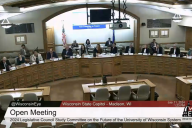You have /5 articles left.
Sign up for a free account or log in.
Like just about any socially aware college campus these days, Southern Polytechnic State University has a recycling program designed to separate reusable materials from garbage headed for the landfill. As environmental issues rise on the agenda of campus officials and of students, given the university's participation in the American College & University Presidents Climate Commitment, administrators at Southern Polytechnic have talked about ramping up the recycling program.
But as they discussed that possibility, they also acknowledged doubts, based on anecdotal evidence, about whether the current program was working.
So borrowing from peers such as the University of Oregon and the University of Missouri -- "we're willing to recycle everything, including good ideas," says Lisa Rossbacher, the university's president -- Southern Polytechnic conducted a "trash audit." It took 10 percent of the solid waste generated in a week by five buildings on the Marietta, Ga., campus -- the student center, a dorm, two classroom buildings and an administrative facility -- plopped the 37 bags of garbage down on the main quad and dug through them to see what they contained.
As students and staff wandered by, sometimes offering to help out (“Give me some gloves -- I’m in," one person said, after asking what they were up to), Rossbacher, Jim Cooper, the university's sustainability director, and others separated the material into several categories: products that could be recycled (plastic, aluminum, etc.), food and other waste that could be composted, and legitimate garbage destined for the dump.

Jim Cooper, Julie Newell, a professor, and President Lisa A. Rossbacher examine trash at Southern Polytechnic.
One piece of good news: “We expected to find a lot more beer cans,” says Cooper, “and found none.”
But much of what they found disappointed campus leaders. “Fifty-six percent of the stuff in our trash was either recyclable or compostable,” Cooper says, meaning that less than half of what the university was planning to send to the landfill should have been going there.
The results varied based on the building. The haul from the main academic building, which is widely seen as having the best recycling operation on the campus, included 8.5 lbs. of plastic, which, given how light the material is, “is a lot of Coke and water bottles,” Cooper notes.
Fourteen percent of the garbage by weight was food waste, which “tells us that if we started a composting program, we would have plenty of material,” Cooper says.
Ten percent of the trash was office paper that would have been recyclable, much of it from the architecture building, often from reprinting of student drawings and documents.
And a significant amount of the trash in volume, though hard to measure by weight, was Styrofoam.
The latter problem was one of the first and most easily addressed by Southern Polytechnic after the audit. “One of our providers uses a lot of Styrofoam, and when we raised it, they immediately agreed to find another container that works for them financially, but also doesn’t create havoc in a landfill,” Cooper says.
Other issues may be harder to fix. The fact that the main academic building generated so much plastic waste even though it has the most advanced recycling operation shows the complexity of getting such programs to work. “That building has got the bins in the right places and there’s still a lot of plastic,” Cooper says. “This will require a major educational undertaking.”
Figuring out exactly how to change the recycling program in response to the findings of the trash audit will fall to a special campus committee whose work is just beginning. No matter what emerges, Cooper says, the important thing is that Southern Polytechnic now has real data to guide its decisions, and a baseline for measuring itself going forward.
"It's better to know where you stand," he says, "than to depend on anecdote."









